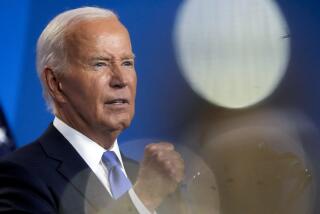Dukakis Forces Reject Key Jackson Platform Issues
- Share via
DENVER — Backers of Massachusetts Gov. Michael S. Dukakis voted down a proposal by supporters of the Rev. Jesse Jackson to raise taxes on the rich and to freeze defense spending as the Democratic Party’s platform committee readied the party’s campaign manifesto Saturday.
The platform, shorter and sketchier than any other in recent history, will be submitted next month to delegates to the party’s nominating convention in Atlanta.
The vote on the budget proposal--the key domestic policy disagreement between the two campaigns--was 108 against to 44 in favor.
At this first and final meeting of the full platform committee at a downtown hotel, the Dukakis forces also ruled the day on foreign policy and national security issues.
In these areas, backers of Dukakis, who is the party’s presumed nominee, defeated attempts by the Jackson campaign to amend the draft platform by inserting language renouncing first use by the United States of nuclear weapons and calling for the nation to back Middle East peace efforts based on “mutual recognition, territorial compromise and self-determination for Israelis and Palestinians.”
Leaders on both sides stressed the harmony that they said had prevailed since the drafting of the platform began last weekend on Mackinac Island, Mich. Richard G. Hatcher, former mayor of Gary, Ind., and Jackson campaign chairman, said there was agreement on “97%” of the platform.
But for all of the talk of compromise and conciliation, the fact remained that on the issues of taxes, defense spending, nuclear weapons and the Middle East, regarded by both campaigns as the most significant items in the platform, neither side gave enough ground to prevent a showdown vote. All four issues are likely to be debated on the floor of the convention as well.
There are practical political reasons for this. For the Dukakis campaign, the votes provided an opportunity to separate the party’s likely standard-bearer from the beliefs of his only remaining challenger, views which most Democratic strategists consider to be too far to the left to suit the taste of the general electorate.
For Jackson, on the other hand, these votes helped underline the identity of his campaign and define his candidacy at a point when there are no more electoral battles for him to fight.
Stress Need for Revenue
The “comprehensive budget plan” supported by the Jackson forces argued that new revenue was needed “if we are to seriously pursue our commitments to build a secure economic future for all Americans.”
The Jackson plank sought to return taxes on the 600,000 Americans earning more than $200,000 a year to the 1977 levels of 50% from the present top rate of 28%. It also sought to boost taxes on corporations to 46%, the rate that prevailed when President Reagan took office in 1981, from the current rate of 34%.
In introducing the proposal, Hatcher contended that it would raise $20 billion a year.
The amendment also called for freezing military spending at the current levels, claiming that the military budget had been doubled in the last seven years.
The Dukakis forces, however, argued that such specific recommendations were out of keeping with the tone of the 1988 platform, which party leaders, acting on the advice of national chairman Paul G. Kirk Jr., have sought to make as generalized as possible. They have come to believe that the lengthy list of promises made in past documents, such as the 50,000-word 1984 platform, alienated more voters than they won over to the Democratic side.
Few Specifics
Accordingly, the 1988 draft is just over 3,000 words long and contains few specifics.
Implicit in the arguments by the Dukakis camp was the recollection of Walter F. Mondale’s 1984 promise to raise taxes, a pledge that many believe contributed greatly to his landslide defeat. The issue of taxes has taken on particular salience in recent days because Dukakis has been forced by budget problems in his home state to endorse a tax increase there and his almost certain opponent in the fall, Vice President George Bush, has sought to use this against him.
“I have never believed that it is one of the Democratic Party’s principal goals and values to raise taxes on Americans,” said Rep. Robert T. Matsui (D-Sacramento), one of the major spokesmen for Dukakis on the platform committee, in opposing the Jackson amendment.
Dukakis has said that he will consider a tax increase only as a “last resort” to solve the budget deficit, meanwhile drawing on previously uncollected taxes to cut down on the existing red ink.
Political considerations similar to those that affected the Dukakis opposition to the tax increase influenced the governor’s position on the defense freeze. Democrats believe they have paid a price with the electorate in recent presidential campaigns because of the belief they are not sufficiently committed to a strong national defense.
See Jewish Supporters
On the Middle East, Jackson supporters contended that the language they offered was backed by many Jewish-Americans and Israeli citizens and had indeed been used in a newspaper advertisement last year backed by a number of prominent leaders of the Jewish-American community.
But Dukakis backers said the language did not conform to the procedures for reaching a Mideast settlement between Israel and its Arab neighbors that were laid down by the Camp David accords, the peace formula Dukakis has endorsed throughout his campaign.
The Dukakis forces opposed the “no-first use” amendment on nuclear weapons, because they said it was a departure from traditional U.S. policy and would restrict the flexibility of Dukakis as commander-in-chief to respond to the threat of aggression.
More to Read
Sign up for Essential California
The most important California stories and recommendations in your inbox every morning.
You may occasionally receive promotional content from the Los Angeles Times.













